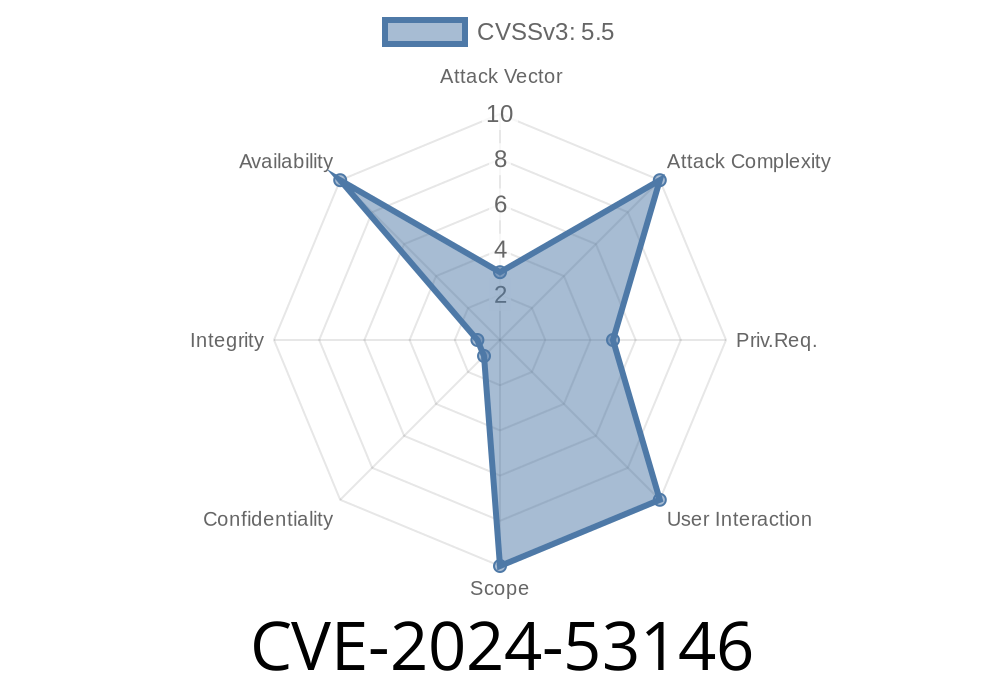Recently, a vulnerability labeled CVE-2024-53146 was identified and fixed in the Linux kernel's Network File System Daemon (NFSD). This post provides a clear explanation of this bug, its impact, how it can be exploited, and walks through the related kernel code. We’ll also link to original sources for reference.
What is CVE-2024-53146?
CVE-2024-53146 is an integer overflow bug in Linux kernel's NFS server that could potentially be triggered by a malicious client providing a carefully crafted request. If the tag length field in an NFSv4 compound response is set to a value near the maximum for a 32-bit unsigned integer (U32_MAX), the kernel could be tricked into a faulty memory operation, possibly leading to crash or further exploitation.
Where is the Vulnerability?
The bug exists in the NFSD’s (Network File System Daemon) NFSv4 code path, specifically when handling the “tag length” for NFS compound responses. The problematic code does not properly restrict how big the taglen value can be, so performing math like taglen + 4 can wrap around to zero (or another small value), causing the kernel to misinterpret buffer lengths. This is a classic arithmetic overflow bug.
Here's a simplified real-world code excerpt before the fix
// Vulnerable code (before the fix)
u32 taglen;
if (!xdr_stream_decode_u32(xdr, &taglen))
return ;
if (taglen > xdr->end - xdr->p)
return ;
if (!xdr_stream_decode_opaque_inline(xdr, &tag, taglen))
return ;
// ...later, in the same context
if (!xdr_stream_decode_u32(xdr, &length))
return ;
if (length + 4 > xdr->end - xdr->p)
return ;
The Problem: If a malicious client sends taglen close to the maximum allowed:
taglen = U32_MAX - 3
the addition (length + 4) overflows, causing the kernel to believe the buffer is smaller, which results in out-of-bounds access or other memory errors.
How Could This be Exploited?
- Attack vector: Attackers must be able to communicate with the kernel's NFSD over the network (NFSv4 enabled and exported).
- Exploit scenario: A client sends an NFSv4 compound call with taglen field set to xFFFFFFFC (U32_MAX - 3). The subsequent calculation taglen + 4 will overflow to a small value. This hijacks the kernel’s understanding of data size, potentially causing it to read or write memory out-of-bounds.
Example Exploit Pseudocode
# Pseudocode: send NFSv4 compound reply with large taglen
from socket import socket, AF_INET, SOCK_STREAM
import struct
s = socket(AF_INET, SOCK_STREAM)
s.connect(("NFSD_SERVER_IP", 2049))
taglen = xFFFFFFFC # U32_MAX - 3
nfs_header = struct.pack(">I", taglen)
# The rest of the RPC/NFS message would follow
s.sendall(nfs_header + b"A" * taglen)
# Server processes, triggers overflow
*Note: Real exploit would need complete NFSv4 structure.*
How Was It Fixed?
Patch commit: b2125d89e4d2 nfsd: prevent integer overflow in decode_cb_compound4res
Key Fixes
- The fix checks if the taglen will remain within a sane boundary before performing arithmetic with it.
Patched snippet
u32 taglen;
if (!xdr_stream_decode_u32(xdr, &taglen))
return ;
if (taglen > xdr->end - xdr->p)
return ;
if (taglen > MAX_TAGLEN) // New check!
return ;
if (!xdr_stream_decode_opaque_inline(xdr, &tag, taglen))
return ;
Mitigation & Recommendations
- Apply kernel updates: Make sure your Linux systems are running a kernel version including this fix (mainline June 2024+, or vendor backports).
- Limit NFS exposure: Restrict access to trusted networks; never expose NFS services to the public internet.
- Monitor logs/crashes: Watch for kernel warnings or crashes related to NFSD/nfsd4_* functions.
References
- Linux Kernel commit: b2125d89e4d2 (official patch)
- NFSv4 RFC 753 - Protocol reference
- CVE entry (NVD) - CVE-2024-53146
Final Notes
CVE-2024-53146 is another reminder that input validation and integer overflow checks are essential in network-facing code. Always update your kernels promptly, and never expose critical services like NFS to untrusted networks.
Timeline
Published on: 12/24/2024 12:15:22 UTC
Last modified on: 01/20/2025 06:19:43 UTC
